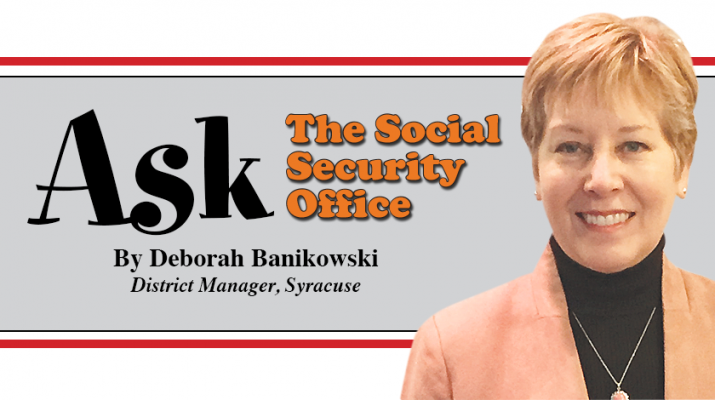By Deborah Banikowski
District Manager, Syracuse
Did you know you can see your work history online all the way back to your first job? Your earnings history is a record of your progress toward your Social Security benefits. We keep track of your earnings so we can pay you the benefits you’ve earned over your lifetime. This is why reviewing your Social Security earnings record is so important.
If an employer didn’t properly report just one year of your earnings to us, your future benefit payments could be less than they should be. Over the course of a lifetime, that could cost you tens of thousands of dollars in retirement or other benefits to which you are entitled. It’s important to identify reporting problems as soon as possible. As time passes, you may no longer have easy access to past tax documents, and some employers may no longer exist or be able to provide past payroll information.
While it’s your employer’s responsibility to provide accurate earnings information to us, you should still review and inform us of any errors or omissions so you get credit for the contributions you’ve made through payroll taxes. You’re the only person who can look at your lifetime earnings record and verify that it’s complete and correct.
The easiest way to verify your earnings record is to visit www.ssa.gov/myaccount and set up or sign in to your personal my Social Security account. You should review each year of listed earnings carefully and confirm them using your own records, such as W-2s and tax returns. Keep in mind that earnings from this year and last year may not be listed yet.
You can find detailed instructions on how to correct your Social Security earnings record at www.ssa.gov/pubs/EN-05-10081.pdf.
Let your friends and family know they can access important information like this any time at www.ssa.gov and do much of their business with us online.
Q&A
Q: I’m trying to figure out how much I need to save for my retirement. Does the government offer any help with financial education?
A: Yes. For starters, you may want to find out what you can expect from Social Security with a visit to Social Security’s retirement estimator at www.socialsecurity.gov/estimator. The Financial Literacy and Education Commission has a website that can help you with the basics of financial education: www.mymoney.gov. Finally, you’ll want to check out the Consumer Financial Protection Bureau, which offers educational information on a number of financial matters, including mortgages, credit cards, retirement, and other big decisions. Visit the Consumer Financial Protection Bureau at www.consumerfinance.gov.
Q: My grandmother receives Supplemental Security Income (SSI) benefits. She may have to enter a nursing home to get the long-term care she needs. How does this affect her SSI benefits?
A: Moving to a nursing home could affect your grandmother’s SSI benefits, depending on the type of facility. In many cases, we have to reduce or stop SSI payments to nursing home residents, including when Medicaid covers the cost of the nursing home care. When your grandmother enters or leaves a nursing home, assisted living facility, hospital, skilled nursing facility, or any other kind of institution, you must notify Social Security right away. Learn more about SSI reporting responsibilities at www.socialsecurity.gov/ssi. Call Social Security at 1-800-772-1213 (TTY 1-800-325-0778) to report a change.
Q: Are Supplemental Security Income (SSI) payments paid only to disabled or blind people?
A: No. In addition to people with disabilities or blindness, SSI payments can be made to people who are age 65 or older and have limited income and financial resources. For more information, read Supplemental Security Income (SSI) at www.socialsecurity.gov/pubs/11000.html.
Q: I pay my monthly premium directly to my Medicare prescription drug plan provider. Why can’t I also pay my income-related monthly adjustment amount directly to my Medicare prescription drug plan provider?
A: By law, we must deduct your income-related monthly adjustment amount from your Social Security payments. If the amount you owe is more than the amount of your payment, or you don’t get monthly payments, you will get a separate bill from another federal agency, such as the Centers for Medicare & Medicaid Services or the Railroad Retirement Board. Read Medicare Premiums: Rules for Higher-Income Beneficiaries for an idea of what you can expect to pay at www.socialsecurity.gov/pubs.

